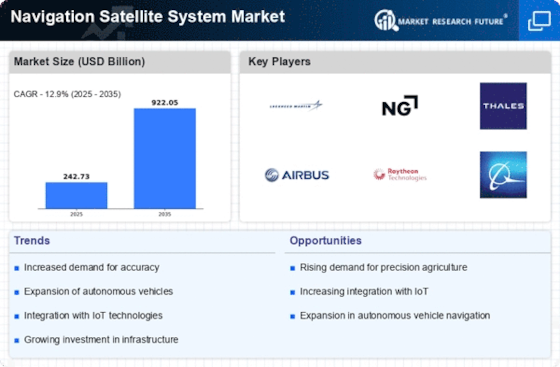Top Industry Leaders in the Navigation Satellite System Market
Competitive Landscape of Navigation Satellite System Market
The Navigation Satellite System (GNSS) market, encompassing constellations like GPS, Galileo, GLONASS, and BeiDou, is a critical pillar of modern location-based services. Fueled by pervasive adoption across diverse industries. This growth translates to an intense competitive landscape, where established players battle for market share with innovative newcomers.
Key Players:
- Qualcomm Technologies Inc
- Hexagon AB
- Trimble Inc
- Septentrio N.V
- U-Blox Holding AG
- Quectel Wireless Solutions Co., Ltd.
- Topcon Corporation
- NavCom Technology Inc
- ST Microelectronics NV
- Spaceopal Gmbh,
Market Share Analysis:
- Constellation Coverage: Availability and accuracy of satellite signals in different regions play a crucial role. Strong satellite networks in developing markets offer significant growth potential.
- Technology Differentiation: Offering higher accuracy, robustness, or integration with advanced technologies like augmented reality can win customer preference.
- Application Focus: Specializing in specific sectors like automotive, aviation, maritime, or agriculture creates a competitive edge by catering to diverse needs.
- Cost Effectiveness: Balancing affordability with quality is key, especially in cost-sensitive segments like consumer electronics.
- Government Support: National GNSS programs can provide significant advantages like funding, access to infrastructure, and preferential market access.
New and Emerging Companies:
- Low-Power GNSS Chips: Startups like Fastback Semiconductor and GNSS Tech Lab are developing chips specifically optimized for wearables and IoT devices, enabling longer battery life.
- Multi-GNSS Software Solutions: Companies like Geo++ and Intellisense offer software that seamlessly integrates signals from multiple constellations, improving accuracy and resilience.
- Differential GNSS Services: Providing correction data for improved location accuracy has become a booming sector, with startups like Veripos and Starfix competing with established players.
Investment Trends:
- Constellation Expansion: Leading GNSS programs are investing in larger satellite constellations for improved global coverage and redundancy.
- Advanced Positioning Technologies: Research and development focus on integrating GNSS with other technologies like LiDAR and inertial sensors for even greater accuracy and robustness.
- Autonomous Vehicles: GNSS plays a critical role in autonomous vehicles, and companies are investing in partnerships and collaborations to secure market share in this booming sector.
- GNSS as a Service (GNSSaaS): Delivering GNSS correction data and location-based services via cloud platforms is gaining traction, attracting investment from established players and startups alike.
Latest Company Updates:
January 19, 2024: The US Air Force successfully launched the 10th modernized GPS III satellite on January 18, 2024, further strengthening the constellation and improving accuracy and signal strength.
January 12, 2024: The European Commission announced plans to launch twoadditional Galileo satellites in 2024, bringing the constellation to a total of 36. This will enhance Galileo's global reach and redundancy.,
January 16, 2024: China's BeiDou Navigation Satellite System launched its third-generation BeiDou-3 commercial service on January 15, 2024, offering high-precision positioning and timing services globally.










